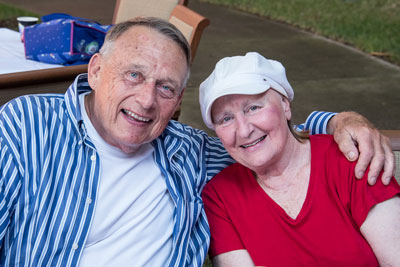
Fight Alzheimer’s Into 2025 and Beyond
Fight Alzheimer’s Into 2025 and Beyond
Don't miss your chance to make a generous gift to our 2025 Annual Fund Drive. Your donation today helps fund essential care and support to those who need it most, while also advancing critical Alzheimer's research.
Donate Now'To Ask for Help Is Courageous'
Male Caregivers Can Overcome Unique Challenges
Male caregivers can overcome unique challenges
 By all accounts, Marty Schreiber has led a very successful life — he raised four kids with his high school sweetheart and wife, Elaine, served as governor of Wisconsin from 1977 to 1979, worked as vice president of an insurance company, and formed his own public affairs consulting firm before recently retiring.
By all accounts, Marty Schreiber has led a very successful life — he raised four kids with his high school sweetheart and wife, Elaine, served as governor of Wisconsin from 1977 to 1979, worked as vice president of an insurance company, and formed his own public affairs consulting firm before recently retiring.
In one aspect of life, however, Schreiber feels he fell short — as a caregiver for Elaine after she
developed Alzheimer's disease.
"We would go for our walks, and she would say, ‘Look at the pretty bird.' I would want to get walking and I'd say, ‘Come on, Elaine, let's move along,'" Schreiber says. "I missed out on sharing moments of joy with her while she was on her journey. I failed to understand that she was a different person, in her own world. As long as I tried to keep her in my world, the experience became more miserable, frustrating and anxious for both of us."
Schreiber attributes his self-perceived shortcomings as a caregiver to ignorance of the disease, but also partially to being male. "I had to be in control, and that is something that I see in many male caregivers," says Schreiber, an Alzheimer's advocate who speaks with caregiver support groups around the country. "We have to beat the disease. We have to do it by ourselves. And as we become more frustrated, upset, discouraged and irritable, we become less capable of helping our loved ones."
Approximately two-thirds of Alzheimer's caregivers are women, but an increasing number of men are taking on the role. The Alzheimer's Association Alzheimer's Disease Facts and Figures report found that between 1996 and 2011, the percentage of men caring for a family member living with Alzheimer's more than doubled from 19% to 40%.
Caregiving is an arduous task for anyone — and men and women aren't all alike. But according to support group leaders and caregiver studies, some men may face challenges unique to their gender. Many men may view Alzheimer's and caregiving as problems to be solved and are hesitant to ask for help. Seeking assistance can be viewed as a sign of weakness. Often, men don't pay enough attention to their own mental and physical well-being. Schreiber says he faced each of these pitfalls as a caregiver.
 Elaine was Schreiber's steadfast supporter through the perils of politics and decades of marriage. When Elaine began exhibiting symptoms of memory loss at age 64, Schreiber wanted to return that support all on his own. He was her full-time caregiver for 12 years until she died in April 2022.
Elaine was Schreiber's steadfast supporter through the perils of politics and decades of marriage. When Elaine began exhibiting symptoms of memory loss at age 64, Schreiber wanted to return that support all on his own. He was her full-time caregiver for 12 years until she died in April 2022.
"I wasn't going to have my wife go into assisted living or memory care because I was going to take care of her," says Schreiber, whose book, "My Two Elaines: Learning, Coping, and Surviving as an Alzheimer's Caregiver," details the couple's experience. "It became my personal battle against the disease rather than helping Elaine to live her best life possible. I finally had to get it into my head that to ask for help is courageous. To ask for help means you're not giving up."
Schreiber eventually moved Elaine into assisted living, something he calls "the toughest decision of my life but the best one for both of us."
Men who do seek help often find support groups are an effective way of coping with caregiving's emotional toll. Michael Williams, a support group facilitator with the Alzheimer's Association Delaware Valley Chapter since 2012, began hosting a male caregiver group in November 2020. Group members — some of whom continue to attend after their loved ones have died — say they are eager to participate because of their common bond.
"They feel comfortable that they can just relax and say what's on their mind without worrying about being judged for having certain thoughts and feelings," Williams says. "They're around people who understand."
Alzheimer’s caregivers can find help
Whether you provide daily caregiving, participate in decision making or simply care about a person living with the disease, we have resources to help.
Topics range from sensitive matters like a husband bathing his wife after an episode of incontinence to tackling new household chores, such as cooking and doing the laundry.
"Most of the men in the group are older," says Williams, a caregiver for his mother, who died with Alzheimer's in 2010. "There are exceptions, but that generation of males isn't used to doing those things. I haven't run across anyone [in the group] who was reluctant to take on the role. They just need some guidance. They just need some help and to talk about it."
Williams shares tips during support group sessions, such as the importance of getting legal affairs like power of attorney in order before it's too late. When Schreiber talks to other male caregivers, his advice is personal and equally practical.
"Don't make the same mistakes I made," he says. "Join the world the person is now in. Look for moments of joy, and make sure you take care of yourself so you have the strength to take care of your loved one. Don't be afraid to ask for help."

The first survivor of Alzheimer's is out there, but we won't get there without you.
Donate Now
Learn how Alzheimer’s disease affects the brain.
Take the Brain Tour
